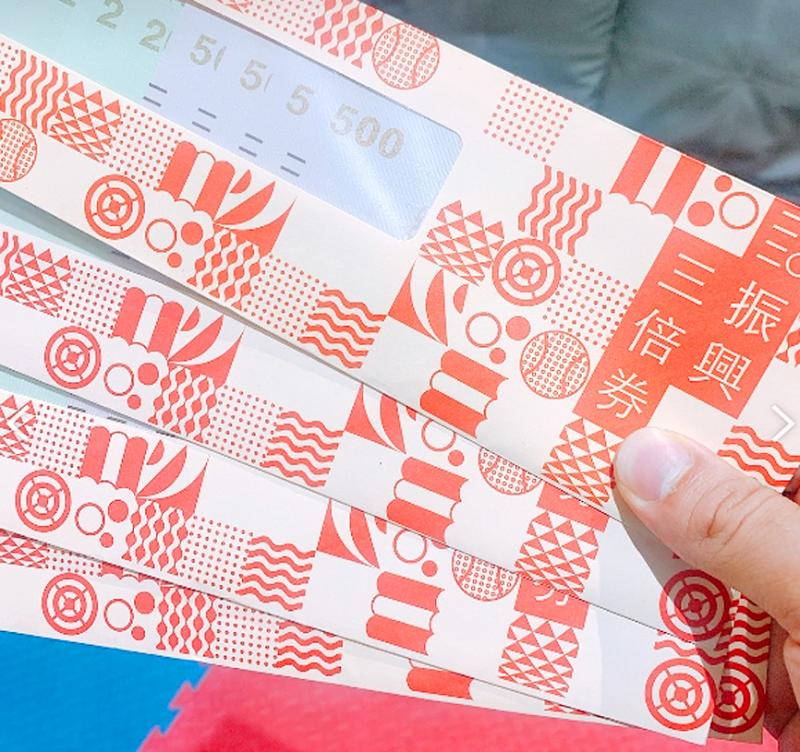The Executive Yuan yesterday signaled that it might do away with an upfront payment in its planned quintuple stimulus voucher program, as differentiating between who would qualify to have the NT$1,000 buy-in waived might cost too much to administer.
Last year’s Triple Stimulus Voucher program had a provision for groups, including low-income families, to receive the NT$3,000 in vouchers without paying the NT$1,000, Executive Yuan spokesperson Lo Ping-cheng (羅秉成) said, adding that similar measures are planned for this year’s program, with those who received COVID-19 pandemic relief funds to benefit.
If the government were to waive the fee for those who received relief funds as well as groups — such as farmers, fishers, taxi drivers, tour guides, self-employed individuals and uninsured workers — who received government subsidies, almost half of Taiwan would be eligible not to pay the buy-in, Lo said.

Photo: Hung Mei-hsiu, Taipei Times
Premier Su Tseng-chang (蘇貞昌) said that a situation in which half of the nation is paying to enter while the other half is not might create social conflict.
Moreover, determining who is eligible to have the fee waived becomes more complicated with each condition, leading to enormous administrative costs, Su said.
With the Directorate-General of Budget, Accounting and Statistics estimating that GDP growth this year might reach 5.88 percent, the government might be in a position to absorb the loss if the upfront payment of NT$1,000 is waived for the entire nation, Su said, adding that agencies have been asked to assess whether such a move is feasible.
The Executive Yuan announced the possible change after Democratic Progressive Party legislators over the past few days called for the government to waive the upfront payments.
Last year, an upfront payment of NT$1,000 was exchanged for NT$3,000 of vouchers.
The quintuple stimulus voucher program plan is for NT$5,000 of vouchers.
Additional reporting by CNA

The manufacture of the remaining 28 M1A2T Abrams tanks Taiwan purchased from the US has recently been completed, and they are expected to be delivered within the next one to two months, a source said yesterday. The Ministry of National Defense is arranging cargo ships to transport the tanks to Taiwan as soon as possible, said the source, who is familiar with the matter. The estimated arrival time ranges from late this month to early next month, the source said. The 28 Abrams tanks make up the third and final batch of a total of 108 tanks, valued at about NT$40.5 billion

Two Taiwanese prosecutors were questioned by Chinese security personnel at their hotel during a trip to China’s Henan Province this month, the Mainland Affairs Council (MAC) said yesterday. The officers had personal information on the prosecutors, including “when they were assigned to their posts, their work locations and job titles,” MAC Deputy Minister and spokesman Liang Wen-chieh (梁文傑) said. On top of asking about their agencies and positions, the officers also questioned the prosecutors about the Cross-Strait Joint Crime-Fighting and Judicial Mutual Assistance Agreement, a pact that serves as the framework for Taiwan-China cooperation on combating crime and providing judicial assistance, Liang

A group from the Taiwanese Designers in Australia association yesterday represented Taiwan at the Midsumma Pride March in Melbourne. The march, held in the St. Kilda suburb, is the city’s largest LGBTQIA+ parade and the flagship event of the annual Midsumma Festival. It attracted more than 45,000 spectators who supported the 400 groups and 10,000 marchers that participated this year, the association said. Taiwanese Designers said they organized a team to march for Taiwan this year, joining politicians, government agencies, professionals and community organizations in showing support for LGBTQIA+ people and diverse communities. As the first country in Asia to legalize same-sex

MOTIVES QUESTIONED The PLA considers Xi’s policies toward Taiwan to be driven by personal considerations rather than military assessment, the Epoch Times reports Chinese President Xi Jinping’s (習近平) latest purge of the Chinese People’s Liberation Army (PLA) leadership might have been prompted by the military’s opposition to plans of invading Taiwan, the Epoch Times said. The Chinese military opposes waging war against Taiwan by a large consensus, putting it at odds with Xi’s vision, the Falun Gong-affiliated daily said in a report on Thursday, citing anonymous sources with insight into the PLA’s inner workings. The opposition is not the opinion of a few generals, but a widely shared view among the PLA cadre, the Epoch Times cited them as saying. “Chinese forces know full well that